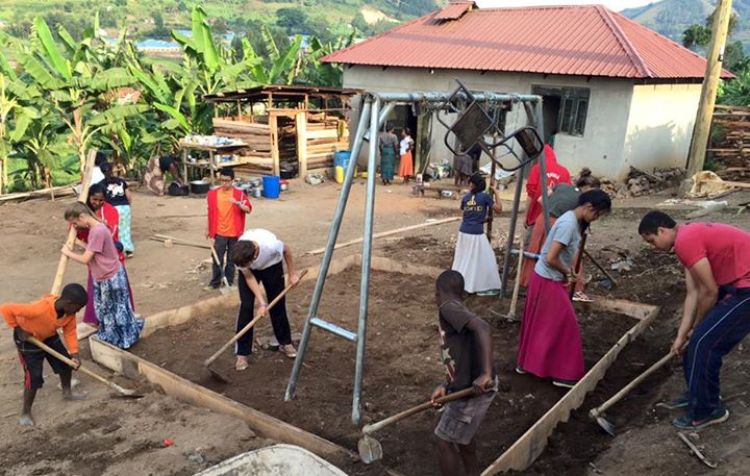A team of students and teachers from Dulwich College Shanghai are working alongside Peace and Golden Magezi in Bukinda, Uganda, in order to build, support and run an orphanage that will give 40 kids some hope of love, family and education for the future. Here is a blog post from one of the students from Dulwich College, Courtney McAtee, telling us about a day as a volunteer building the orphanage.
Day 9
We started the day by leveling the ground beneath the swings. It was quite hard because we had to level it on a slant. Also, it was a warm day so we had to keep hydrated. To avoid turning the swing area into a mud pit in the rainy season, we were building a large 4 by 4 meter sandpit to surround the swing. We managed to level the ground, build edges so the sand wouldn't spill out and collect water to keep the soil underneath compact. For the edge of the sandpit we needed to collect large pieces of timber, each well over three meters long and quite thick. We carried the wood down the hill on our shoulders and then sawed it to the right size. It was a long day of physical labor, perhaps our longest so far. Some days we have not managed to see much difference in the land despite hours of work, which can be a little demoralizing, but today was quite satisfying as we could clearly see a huge difference with the land leveled and the new large sandbox surrounding the swings. It felt good.
After finishing all that, we wanted the soil to stay in place so we had to collect some water to sprinkle onto the dusty soil before stamping it firmly down. Collecting water was the hardest part of my day. When I arrived at the water pipe loads of people were waiting to fill their jerry cans at the local standpipe, and seeing the long line it made me realize that this is a daily reality for so many people. After they filled it, they placed it on their head and walked off. This all looked simple until I tried it! I filled my 20 liter can and then shoved half a plantain (a hard, unripe savory banana) into the top to keep the water from spilling out. Most people would carry it on their heads, so I tried this first but it put a lot of strain on my neck and head so this method didn't last long. I then decided to try putting it on my shoulder, like how we had carried the wood earlier. I found that hard to balance as the water sloshed around so much inside the can that it was very destabilizing and would just slip off. In the end, I just carried it with my hands underneath the bottom of the can. 20 liters of water is about 20 kilos, so these cans were heavy! As if that wasn't hard enough we had to cross over streams, jump over gaps, climb up steep hills and go through people's back gardens and fields to carry it back home. From the water pipe to The Peace Centre is probably around a 1 kilometer walk, so it is safe to say that by the end I was exhausted. I can't imagine how people can do this every day all day, when all I have to do is turn on a tap to get water.
Later on in the evening there was a talk at the Peace Centre children about human rights. Some of them knew they had a right to clean water, education and healthiness, but some of them seemed surprised to hear about it. Most of them would have come from backgrounds where they wouldn't go to school or have enough food each day. I see a lot of children around Bukinda who don't go to school but instead spend their days looking after cows and goats, or collecting water for their family. The Peace Centre children are lucky they now have access to clean water and lots of food every day, as well as an education, and I got the impression that they felt that tonight.
The last thing we all did today was to help the children write to their sponsor families. I was with one of the youngest kids in TPC and he didn't fully understand the role of the sponsor yet, except that they are a person/family living far away who support him and want him to do well. He got his first letter from his sponsor today and he started to understand more about it. He calls his sponsor Tata (dad). Four children received their first communications from their sponsors tonight and especially for the ones who were a little older, it was pretty amazing witnessing their reactions to receiving this. The majority clearly does understand and appreciate the role of the sponsor: that of a long distance adoptive parent/family. Some of these children were just bubbling with excitement, and even crying tears of happiness when receiving these emails. If any sponsors are reading this blog, know how much of an impact your communications mean to these children. We all got to see the extreme joy and massive smiles first hand tonight and it was very special.


















